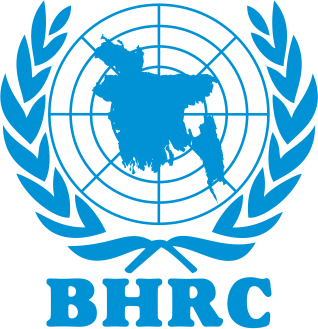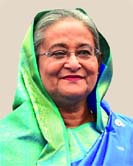

|
EDITOR
|
Editorial
‘Fortnightly’
পাক্ষিক |
|
|
Government wants
to control traffic in Dhaka digitally: Prime
Minister

Human Rights Report
Prime Minister
and Leader of the House Sheikh Hasina on Wednes said
her government wants to control traffic signal
digitally to ease traffic jam in the capital.
"We want to control traffic in Dhaka city
electronically and digitally… some parts of the
capital have already been brought under such a
system and if the system is introduced in rest of
the parts, the sufferings of the people will be
reduced to a great extent," she said.
The prime minister was replying to a supplementary
raised by Jatiya Party lawmaker Kazi Feroz Rashid in
the House during her question-answer session with
Speaker Dr Shirin Sharmin Chaudhury in the chair.
The Leader of the House said her government has
reintroduced automatic signalling system in Dhaka
city which almost went out of order previously.
She said traffic could be controlled manually in
some cases, but there are allegations that this
system is applied in some areas for a long time.
"So I would like to tell the authorities, which
control traffic signal, not to hold vehicles for so
much time," she said.
The Leader of the House said the traffics in Dhaka
city are now struggling to control signal due to
pressure of huge number of vehicles. "But traffic
jam will be reduced to a great extent if digital
system is introduced in the entire city," she said.
.
BHRC & IHRC Human Rights Report on February 2019 in Bangladesh
Total 181 persons killed in February 2019
Human Rights Report:
The documentation section of
Bangladesh Human Rights Commission (BHRC) and
International Human Rights Commission-IHRC jointly
furnished this human rights survey report on the
basis of daily newspapers and information received
from its district, sub-district and municipal
branches. As per survey it appears that 181 peoples
were killed in February, 2019 in all over the
country. It proves that the law and order situation
is not satisfactory. Bangladesh Human Rights
Commissions extremely anxious about this situation.
In the month of February, 2019 average 6 people were
killed in each day.
The Law enforcing agencies and related Govt.
departments should be more responsible so that
percentage of killing February be brought down to
zero level. To institutionalize the democracy and to
build human rights based society the rule of law and
order must be established everywhere. Through
enforcing rule of law only such violation against
human rights can be minimized.
It appears from documentation division of BHRC:
Total 181 person killed in February 2019
Killing for dowry 3, killing by family violence 17,
Killed due to social discrepancy 38, Political
killing 7, Killed by Law enforcing authority 22,
Killed due to BSF 5, Killed due to doctor negligence
4, Abduction 4, Assassination 5, Mysterious death
35, Women & Chilled killed due to rape 4, Killed by
Acid throwing 2.
Killed by several accidents: Killed by road accident
273, Suicide 11.
Besides victims of torture:
Rape 20, Sexual Harassment 6, Torture for Dowry 4,
Acid throwing 1, Journalist torture 1.
Bangladesh seeks continued French support for safe return of Rohingyas
Human Rights Report:
Foreign Minister Dr AK Abdul Momen on Thursday
sought continued French support to create conducive
environment inside the Rakhine State of Myanmar for
their dignified return in safety and security.
"France-South East Asia," the Inter-parliamentary
Friendship Group, headed by the Senator and
President Jacky Deromedi, met the Foreign Minister
at his office and discussed the issue.
The French inter-parliamentary delegation highly
appreciated the significant support that was
extended by Bangladesh to the Rohingya people.
The French delegation assured to continue supporting
the cause of the Rohingyas.
Foreign Minister appreciated the existing excellent
mutual understanding between Bangladesh and France
on the important issues like climate change and
peacekeeping.
He also urged the French businessmen and investors
to invest in Bangladesh in energy, infrastructure
and other sectors also and for taking the advantages
of the country's demographic dividend and attractive
packages that are on offer in 100 Special Economic
Zones (SEZ).
The French inter-parliamentary delegation
appreciated the impressive development in Bangladesh
and expressed their interest to organize a Business
Forum within French parliament, engaging the French
business community, where Bangladesh could showcase
the huge economic and business opportunities that
currently exist in Bangladesh.
The other members of the delegation are Jerome
Durian, President of the Bangladesh sub-group, Simon
Sutour, Senator of Gard Region and Anne Laure Saint-Dizier,
Executive and Secretary of the Senate House.
The Group covers six ASEAN countries (Burma/Myanmar,
Brunei, Malaysia, Philippines, Singapore, Thailand)
and Bangladesh.
Welcoming the delegation Foreign Minister Momen
thanked the delegation for visiting Bangladesh.
Referring to French support during our Liberation
War in 1971, he fondly recalled the important
contribution made by renowned French intellectual
and politician Andre Malraux during and after the
Liberation War of Bangladesh.
He also praised France and her people for being the
beacon of democracy for freedom loving people across
the world.
Earlier on Wednesday, the delegation met Speaker Dr
Shirin Sharmin Chaudhury, MP and the Chairperson of
the Parliamentary Standing Committee on Foreign
Affairs.
Estimating Women's Contribution to the Economy
Afsan Chowdhury
In developing world,
women comprise half of the entire population and
they are the poorest of the poor not merely in
wealth but in every other index of development. In
relation to 55% women are directly or indirectly
attached with agricultural activities around the
world. On the basis of women's role in mainstream
economy; Center for Policy Dialogue (CPD) and
Manusher Jonno Foundation (MJF) had published a
research based manuscript on "Estimating Women's
Contribution to the Economy: The Case of Bangladesh"
in 2015.
This volume is edited by Fahmida Khatun, Towfiqul
Islam Khan, Shahida pervin and Hosna Jahan.
Researchers explain women i the economy of
Bangladesh, estimate time spent by both women and
men on all types of daily activities, economic value
of woman's uncounted activities, generate
recommendations to clarify the woman's status in the
family and society.
Writers elucidate the employment status by sex and
location. In national level, regular paid female
employee 21.8%, self-employed and employee 56%, day
labourer 6.9% and others 15.3%. Author critically
explains the divisional labour force distribution in
Bangladesh which are - Barisal, male(2.3%) &
female(7.4%); Chittagong, male(2.9%) & female(2.5%);
Dhaka, male(1.8%) & female(8.1); Khulna, male(2.8%)
& female(7.9%); Rajshahi, male( 2.5%) &
female(7.6%); Rangpur, male( 2.4%) & female(7.6%)
and finally Sylhet, male(2.9%) & female(7.3%).
The World Health Organization (WHO) estimates that,
37 million people in the developing world suffered
acute or chronic poisoning due to exposure to toxic
pesticides. Women are usually at greater risk of
sickness or morbidity due to pesticide poisoning
than men because they are more likely to work
without protective equipments and are less aware
about the harmful consequences of such chemicals.
This book may contribute to decreasing the workload
of women in the household, increase accessibility to
drinking water and natural gas for cooking. Women
collect essential items ? fruits, vegetables,
medicinal herbs, fuel wood, fodder, water, etc. As
forest products provide the basic needs of the
family, women have a close relationship with the
forest. They know how to plant trees, take care of
gardens and domestic animals.
Collection of water is solely within the domain of
women and girls. They are responsible for collecting
water and for controlling its use. It is the women
who have the knowledge of the location, reliability
and quality of the local water resources. Women are
in close contact with nature not only as consumers
but also as producers and managers of natural
resources.
Researchers recommend eliminating wage
discrimination against women, NGO's role in women's
physical, mental health improvement. Writers advise
to policy makers and politicians to form policies
which are helpful for women. University studies
should emphasize research on women's right and their
health status, economic efficiency, social
recognition, political participation, authors
explain.
This book is very much fundamental for the women's &
gender studies researchers, development planners,
students of economics, social sciences and political
sciences.
Sustainable Development through Environmental Protection
S. M. Rayhanul Islam
Sustainable
Development and Environmental Issues. Published by:
Commonwealth Secretariat, London
We now live in a modern, consumerist and largely
urbanized world where environmental protection is a
key concern of the future of humanity. Economists,
environmentalists, development professionals and
academics nowadays are very concerned about the
problems originated when taking efforts to promote
development ignoring the environmental dimensions of
development. In the 1980s, the term 'sustainable
development' started to be used to describe
development which takes account of environmental
consequences. So, when we talk about 'sustainable
development' we are talking about using our
intelligence and scientific knowledge to satisfy our
needs while maintaining the physical environment.
The Commonwealth publication 'Sustainable
Development and Environmental Issues' explores the
need for the world to bring about sustainable
development, that is a balance between development
and environmental protection, as the 'Rio
Declaration on Environment and Development, 1992'
states: "In order to achieve sustainable
development, environmental protection should
constitute an integral part of the development
process and cannot be in isolation from it". It also
highlights that youth have an important role to play
in bringing about environmental protection and
sustainable development for ensuring a better future
for all.
The module is divided into four units. The first
unit aims to enhance our awareness of key concepts
related to the natural environment and the major
environmental problems facing the world today.
Unfortunately, most of our developmental activities
have simply exploited the earth's raw materials and
released large quantities of waste energy and toxic
materials back into the system. We are faced with
many threats to our environment: the greenhouse
effect, global warming, acid rain, ozone
destruction, soil erosion and so on. This unit also
aims to provide us with materials that we can use to
start an education programme for young people to
raise their awareness of the environment. A basic
programme in environmental awareness provides a
sound foundation for young people to participate in
projects that address environmental problems.
Finally, the unit looks at the more complex concepts
that are important for understanding sustainable
development: inter-connectivity, sacredness, and
renewable and non-renewable resources.
Unit-2 discusses the social environment and its
relationship to the natural or physical environment.
It examines different aspects of social environment
that can affect the physical environment: value
systems, legislation, and global economics. This
unit also examines some of the issues that were
raised at a world youth environmental meeting,
Juventud (Youth)'92, held in San Jose, Costarica.
Young people from all over the world discussed their
concerns about the environment and raised the
following issues at that meeting: poverty and the
environment, external debt, population growth, and
natural resource degradation. 'How can young people
bring about a change?' - considering this question,
this unit explores some of these complex and
inter-related issues. The third unit of the module
examines the major events that have caused the world
to focus the need for environmental protection, in
particular the 1992 Earth Summit. The Earth Summit
conference, held in Rio de Janeiro, was an important
milestone in history. It helped awaken the world to
the need for a development process that does not
endanger future generations.
.
.











